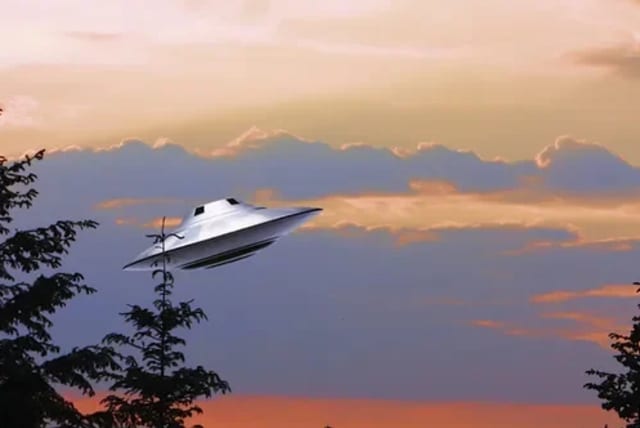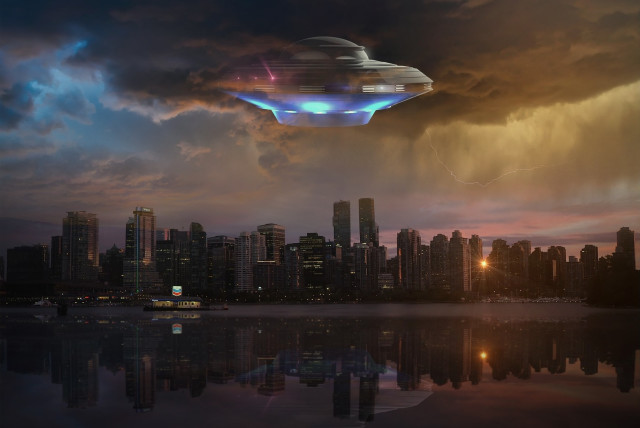UFOs becoming increasingly attractive to US academics - study

A new study shows that interest in studying UFOs/UAPs as reached mainstream academia and many are pushing for further academic research on the subject.
Over a third (37%) of US academics are interested in researching UFOs while a large minority (19%) have either witnessed or know someone who has witnessed unidentified aerial/anomalous phenomena (UAPs), a new study revealed.
The findings of this study were published in the peer-reviewed academic journal Humanities and Social Sciences Communications.
The study comes amid a resurgence in interest in UFOs/UAPs from both the general public, military/defense sectors, and from scientists.
UFOs/UAPs: An interest of growing legitimacy among scientists
Unidentified flying objects (UFOs) have captivated the public consciousness for decades, seen by many as being tantalizing signs of the possible existence of alien life.
However, for years, all details surrounding UFOs were wrapped up in secrecy. This is because the primary fear of governments at the time wasn't that they could be extraterrestrial spacecraft but rather were advanced technology from rival world powers.
However, things have begun to change in recent years, with the US government being more open with its records of sightings of UFOs, rebranded as unidentified aerial phenomena and currently called unidentified anomalous phenomena (UAPs).
Now, interest in UFOs has begun finding its way into mainstream academia. But to what extent is that the case?
How many academics have witnessed UFOs, and how many want to take part in studies related to them?
That's exactly what this study sought to figure out.
The researchers behind the study carried out a survey of 39,984 academics from 144 different American universities – almost 4% of whom actually responded. The low response rate was attributed to a variety of factors, such as a faculty still overwhelmed by COVID, fears that the survey emails were phishing scams, and the fact that the survey was focusing on UFOs, something traditionally considered "taboo" in serious mainstream academia.
The survey was not specific to sciences and covered 13 different academic disciplines, 10% of respondents specializing in political science and another 10% specializing in psychology. Other disciplines included, but were not limited to:
- Art and design
- Journalism
- Economics
- Nursing
- Religious Studies
- Biology
- Physics
- Engineering
- Sociology
What did the survey say?
Overall, the survey found a broad consensus that UAPs have become a more credible and respectable topic in recent years.
Just 19% said that either they or someone they knew witnessed a UFO at some point.
So far, just 4% of respondents said they had done any academic research on UFOs/UAPs. However, over half (55%) said they would be more likely to conduct research into it if they had funding for it, and nearly half (43%) said they would be more likely to do so if there was a reputable academic scholar in their field who did too.
Over a third (37%) also shared that it is very important for there to be further research into UFOs, and almost two-thirds (64%) said it was important for academic scholars to be involved in it.
The emphasis on the importance of academia's role in the study of UFOs comes in the wake of a handful of notable scientists who have made strides in this field.
Chief among them is Israeli-American astrophysicist Avi Loeb, former head of Harvard's Astronomy Department.
Back in 2021, Loeb launched the Galileo Project, which aims to bring the search for alien life purely into the science sector. Since its founding, the project has grown to have millions in funds and has amassed a long list of academics from around the world.
Recently, the Galileo Project published its first eight peer-reviewed scientific articles as it pushes forward to help advance scientific understanding of UFOs/UAPs.
Another prominent researcher is Stanford University professor Dr. Garry Nolan. Despite not being an astrophysicist like Loeb (Nolan is best known as an immunologist), Nolan has been very active in the study of UFOs/UAPs after his 2012 analysis of what was believed to be an alien corpse found in Chile. This later progressed to research to UAPs and how they impacted the brains of those who observed them.
His work has seen him collaborate with government task forces, the CIA, and publish peer-reviewed articles about UFOs.
At the recent Salt iConnections conference in New York, Nolan revealed that he thinks advanced and intelligent alien life has "100%" not only already visited Earth, are still here, and have "been here for a long time."
The evidence he gave was by citing what the US government is doing right now about it, such as passing the National Defense Authorization Act in 2022 and with all the research being done by the All-domain Anomaly Resolution Office (AARO).
The AARO has been active in compiling UFO/UAP sightings. However, back in April, the organization's director, Sean M. Kirkpatrick, has said there has yet to be any evidence of aliens and urged UFO enthusiasts to submit their own findings, research and analyses to be peer-reviewed by credible scientific journals.
"That is how science works," Kirkpatrick said at the time, according to ABC News. "Not by blog or social media."
Jerusalem Post Store
`; document.getElementById("linkPremium").innerHTML = cont; var divWithLink = document.getElementById("premium-link"); if (divWithLink !== null && divWithLink !== 'undefined') { divWithLink.style.border = "solid 1px #cb0f3e"; divWithLink.style.textAlign = "center"; divWithLink.style.marginBottom = "15px"; divWithLink.style.marginTop = "15px"; divWithLink.style.width = "100%"; divWithLink.style.backgroundColor = "#122952"; divWithLink.style.color = "#ffffff"; divWithLink.style.lineHeight = "1.5"; } } (function (v, i) { });

